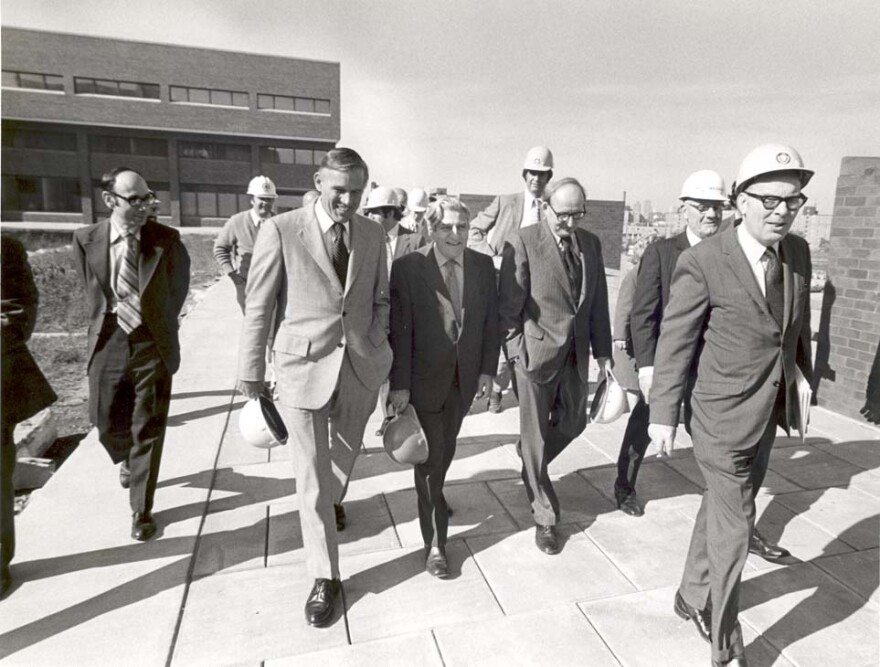When Governor Maggie Hassan talks about why she got into politics her explanation tends to center on her son, Ben.
“Right after he was born Tom and I learned that Ben had severe and pervasive physical disabilities.”
Less emphasized is the role of her father, Robert Wood, a pioneering academic and who held top government jobs -- and even considered his own run for United States Senate in Massachusetts.
By the time he died a decade ago Wood had a resumé that sprawled like suburbia, a term he popularized in book he wrote in 1958 . A political scientist who sought to apply his scholarship to the issues of his age, Wood taught at Harvard and MIT, and variously led the University of Massachusetts, the Boston public school system, and the MBTA.
Wood also helped then President Lyndon Johnson create the department of Housing and Urban Development.
“And then I called in Professor Wood.”
That was Johnson on the phone in January 1966, praising Wood’s work to launch HUD to Wisconsin Senator William Proxmire.
“He’s a pretty unselfish fellow. And he looked at all of 'em and came in with a recommendation that here is the way we ought to organize it and came in with a very clear pattern.”

Wood would later serve as HUD secretary and helped draft the fair housing act.
Those who worked under Wood say his belief that government can effect positive social change was unswerving.
“It was always policy first, what’s the thing we want to do and how to we get it done, and of course those were day when people not only believed in government but we had resources then,” says Georgetown Law professor Peter Edelment, who assisted Wood at UMass.
Robert Wood was raised in Florida, during the Depression. His mother was a school teacher. His father sold shoes. A scholarship got him to Princeton. After fighting in World War II, Wood earned degrees from Harvard and joined the federal government as an urban affairs expert.
Former Massachusetts Governor Mike Dukakis says the fruits of Wood’s push for better schools and more mass transit can be seen all over Boston.
"If Boston is succeeding today it’s because he and not to many other people talked about serious investing - I don’t think they called it infrastructure in those days, but in the sorts of thinking that would bring cites back, and in point of fact it did, and it has."
But Dukakis and Wood clashed when Wood led UMass. Dukakis proposed cuts to the UMass budget, which Wood fought on Beacon Hill and in court.
“He was a very expansive president of the university, and I don’t blame him for that, but it simply wasn’t possible to give UMass increases. So we had some differences there.”
He had these quirks I think people knew they were dealing with someone who knew his way around power. And he used to characterize himself: 'I'm all about power.'
On Wood’s watch, UMass built a new Boston campus and its medical center in Worcester. As MBTA secretary, Wood oversaw the expansion of T service.
His work in the Boston school system began when he was tapped to lead the committee that oversaw court ordered desegregation; it ended with him being fired as superintendent in an administrative battle.
Marcy Murningham worked for him at the time. She described him as tireless in tough situations, and alternately chain smoking and fingering worry beads.
"He had these quirks I think people knew they were dealing with someone who knew his way around power. And he used to characterize himself: ‘I’m all about power.'”
Peter Edelman says Wood was dogged and crafty about getting his way, and that Wood used what some in public life might see as an impediment, a muffled speaking voice, to his advantage.
“'Mumble' was the word, and we never knew if that was actually the way he talked or that was a weapon. It was fairly evident to me that it was a tool. If he wanted to keep his option open he’d do the mumble.”
One option Wood considered was the path chosen by his daughter – elective office.
Wood’s visibility at UMass and battles with Mike Dukakis fueled speculation he would run for Governor in 1978. But Marcy Murningham says Wood actually took a hard, if short, look at getting on the ballot to run for Senate.
“I remember we went out and tried to collect signatures in Quincy market, which was exactly the wrong thing to do, because, A., there are no locals that hang out in Quincy market, they are all tourists. And, B., he just did not like standing there and shaking hands with strangers, he did not like it. He did not like it.”

Now Maggie Hassan is trying to succeed where he father failed.
"The process of running for office and holding elected office wasn’t a good fit for him and I think that would have been my judgement too."
But she says her father’s public service, in all its forms, provided a broader model.
"You know mostly my dad was just a terrific father to me and he and my mom always emphasized that we should do what we wanted to do with that caveat, that you should try to make a difference in the world."
These are words Robert Wood certainly lived by.








